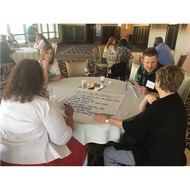The integration of Social Emotional Learning (SEL) in a Virtual Environment
(View Complete Item Description)Social Emotional Learning in Virtual classroom focuses on integrating three main routines to support SEL in a virtual classroom The three routines are check-in, community building, and mindfulness. The Collaborative for Academic, Social, and Emotional Learning (CASEL) defines social-emotional learning (SEL) as “an integral part of education and human development. SEL is the process through which all young people and adults acquire and apply the knowledge, skills, and attitudes to develop healthy identities, manage emotions and achieve personal and collective goals, feel and show empathy for others, establish and maintain supportive relationships, and make responsible and caring decisions.”
Material Type: Activity/Lab, Other, Teaching/Learning Strategy




















